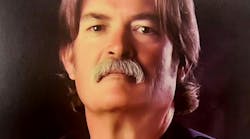What you are thunders so loud
The goal of any officer in court is to have the jury believe her. Sounds simple, but in simplicity lies some of the greatest mysteries. On the one hand, an officer can testify accurately and still be doubted. Yet, another officer can make honest mistakes in her testimony and still be found credible.
An explanation can be found in an oft-cited study conducted by UCLA Professor Albert Mehrabian in which he and his researchers concluded that what we communicate is made up of:
- 7% WHAT we say
- 38% HOW we say it - our voice volume, tone, pitch, etc., and
- 55% NON-VERBAL body language, gestures and demeanor.
The Reid Technique of interrogation recognizes this. Investigators don't decide whether they believe a suspect based primarily on WHAT he says but instead look to cues of voice and body language. While trained police may be more consciously attuned to such cues, we all rely on them - as Mehrabian's study concluded.
Jurors may well decide whether they trust and believe an officer based on the 93% of communication that has nothing to do with WHAT the officer says. This explains why some testifying officers can make honest mistakes in WHAT they say and still be found credible. It also explains how an officer may tell the objective truth - get the 7% WHAT correct - and still be disbelieved.
Ralph Waldo Emerson stated this science poetically,
What you are thunders so loudly I cannot hear what you say to the contrary.
To be found credible, officers must be aware of what influences the 93% of their testimony that is not WHAT they say.
Preparing for the courtroom "interview"
Frances Cole Jones helps clients develop communication skills that will enhance their professional and personal life. In her book, How to Wow, she suggests that prospective job interviewees ask themselves a number of questions before a crucial job interview. Cole understands that the answers to these questions can impact the prospective employee's interview performance in ways they might not be aware of had they not addressed the questions.
The same is true of officers testifying in court. Courtroom testimony is no less crucial an interview given what is at stake for the officer, her agency and the case. Adapted for courtroom preparation, the questions are:
- What 3 words would you use to describe yourself?
- What 3 words do you think others would use to describe you?
- Has anyone every commented on these qualities positively or negatively?
- What 3 words would you like a Judge or jury to use to describe you when you're finished testifying?
A coaching session Cole spent with a client who sought her help preparing for a job interview is instructive. The client had lost millions of dollars of investors' money in a self-started Internet venture. Cole asked him how he would describe himself. He discussed being:
- Aggressive
- Alpha
- Outspoken
The client thought these qualities would show potential employers he was still tough; he still had nerve. When Cole asked him why a prospective boss should hire him, he answered,
I'm not afraid of risk. I may have failed but at least I tried.
As this client spoke, his body language ranged through:
- Shifting side to side
- Leaning in too close
- Lolling back in his chair
- Looking out the window
Cole concluded the client thought his answers would be effective, but they weren't entirely comfortable for him. If he went to an interview like this, a potential employer wouldn't trust him. The employer might not be able to articulate why he didn't trust her client, but he wouldn't.
Cole and her client then discussed what it was like to appear aggressive, alpha, and outspoken to people. Were there times, people, and situations in which being less alpha might be a more effective choice?
At the end of the discussion, when Cole asked why a prospective interviewer should hire the man, he replied,
Because I know the value of a dollar. I know what it means to lose investors' retirement money, or the money for their children's education, and I will never let that happen again."
As he said this, his body didn't shift and he looked her steadily in the eye. He also got the job.
Street credibility may not equal courtroom credibility.
In street confrontations, officers often need:
- Command presence
- Quick decisiveness
- Firmness
- Authority
- Invincibility
- Warrior mind and spirit
But warriors also know the power of humility. Humility is freedom from pride and arrogance. It's an understanding that you are not above or more important than anyone else. Robert Peele, the father of modern policing, understood this power when he said:
The police are the public and the public are the police; the police being only members of the public who are paid to give full time attention to duties which are incumbent on every citizen in the interests of community welfare and existence.
Officers sometimes mistakenly think being decisive means they can't admit mistakes or uncertainty. In the courtroom arena, there is power in looking a jury in the eyes and admitting,
Discover what you need to be in court.
Officers need to be flexible and innovative in response to the unpredictable and varying challenges of street confrontations. The same is true of the courtroom arena.
A firm, commanding, authoritarian presence that is effective on the street may not be nearly as credible in court as an open, thoughtful, considerate, humble one.
Life requires a spectrum of self-expressions. So does policing. Think ahead about what 3 words a jury might use in describing you as a credible witness - or not.



